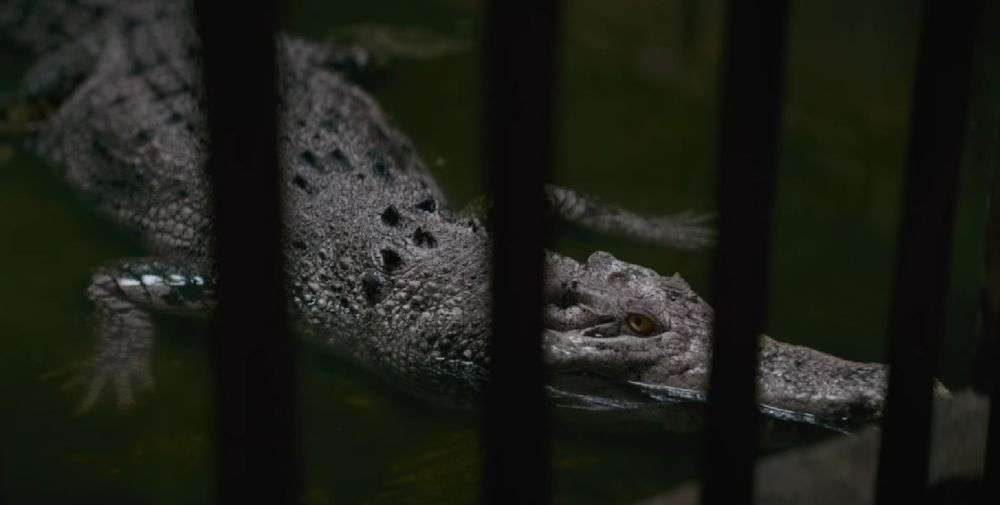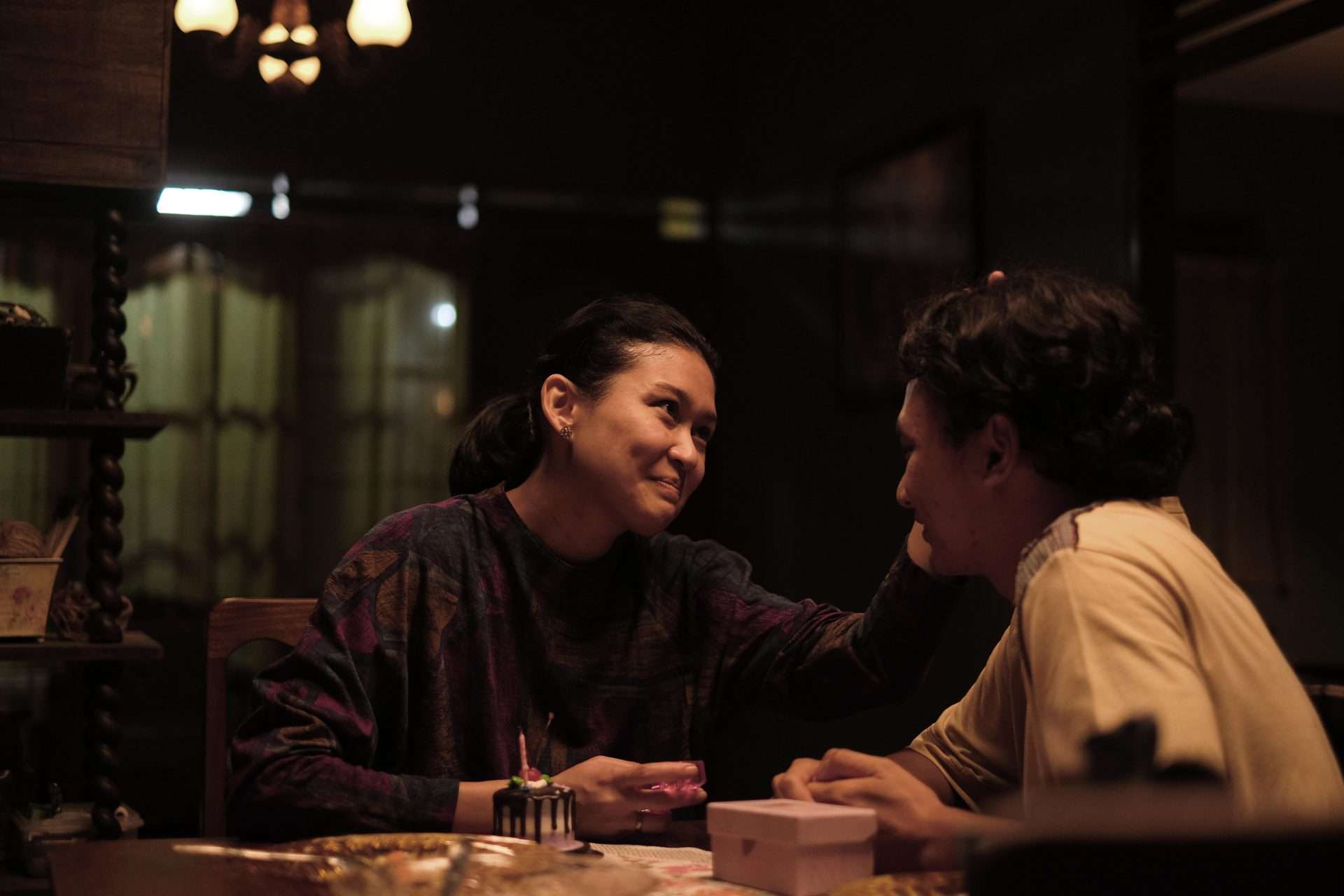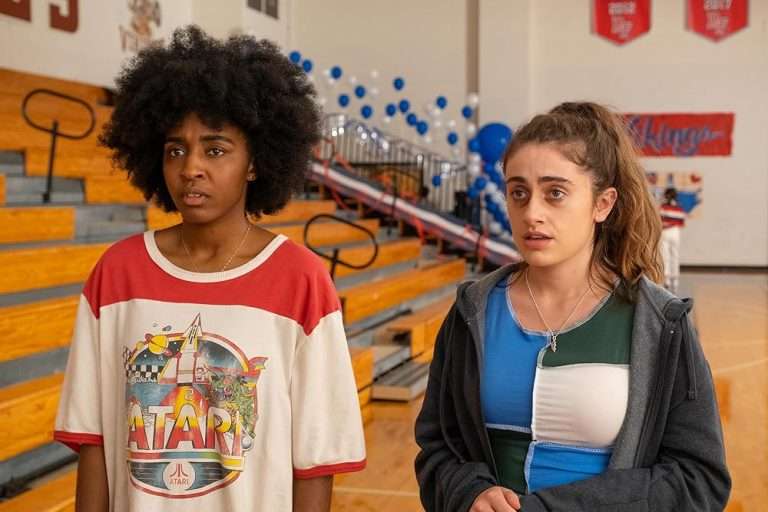It’s dinnertime, and everyone is seated at the table, a strange feeling haunting their minds. Johan (Yusuf Mahardika) keeps his head tucked towards the dishes, remaining silent. Johan’s mother, Mama (Marissa Anita), brings a plate of fried chicken with a fake smile, almost forced, and places it on the table. She’s not contented with the company for her dinner, yet she wants to maintain the decorum.
Arumi (Zulfa Maharani) is pale, almost oblivious that “smile” even exists in her dictionary, and sits on the chair with zero emotions. Mama says, “Let’s eat,” and lays her hands on the plate to place a piece of chicken for Johan. However, she’s not alone in the process, as Arumi holds the plate together with Mama at the same time. Both Arumi and Mama look at each other with a silent gaze while Johan inaudibly pauses his breath. No one is moving now, as everyone is distraught with a pain down their chest.
Director Tumpal Tampubolon’s “Crocodile Tears,” one of the Indonesian features to be selected at TIFF this year, comes with a huge amazement and bonus for thriller fans all over the world. We are introduced to Johan, who works on a crocodile farm owned by his mother, Mama. Johan and Mama are incredibly close, sharing a bond so strong that their relationship teeters on the edge of incest, though it never crosses that line. His overbearing mother is deeply entangled in his love life, wanting him to remain emotionally tethered to her, as if taking control of his choices is her way of ensuring his responsibility.

She somewhat believes that a white crocodile on the farm placed in a separate cage is actually her husband, and she also loves it dearly. Meanwhile, Johan undergoes a process of self-discovery heading towards manhood, during which his love interests and affection seem to blossom, leading him to seek a partner to enrich his love life. Arumi, who meets Johan accidentally, begins to show interest in him. As love progresses between the lovebirds, a form of abhorrence and agony unravels in Mama, guiding her to turn into her darkest form.
The film depicts a complex relationship between a mother and her son, characterized by overprotective parenting that diminishes self-freedom. Johan’s perception of his mother is naive, as love and care obscure his understanding of her overprotective actions. The director guides Johan through an analysis of his troubled upbringing, where he has long been resistant to change, firmly believing that everything established in early parenting is the right path forward in life. His lack of communication with the outside world contributes to his social anxiety, leaving him almost unaware of how to present himself properly for others to see.
However, with Mama, it’s even more intense and concentrated with negativity. We see an individual fiercely committed to her principles and tightly guarded comfort zone, never hesitating to retaliate against anyone who dares to enter her inner circle. One could say that it’s a form of possessiveness to acquire what belongs to her, especially when it involves her son. She exemplifies concentrated jealousy by erasing privacy and making judgments on complex matters. Her method of asserting control resembles Annie Wilkes in “Misery,” albeit without the use of profanity, as her mind is consumed by the desire to bring Johan closer to her in every aspect.
There’s a large inclusion of trust issues with her, yet it dives right into the delusional mind of living in a dream world where it’s her only option to shift away from loneliness. At first, Arumi’s motives appear clear, as she perceives Johan as her true love and initiates a relationship. However, as events unfold, her trust and motives become increasingly questionable. There are multiple obvious frictions between the three individuals, and it’s quite certain that the competition of possessiveness is accompanied by torment and anguish.

However, many bewildering thoughts linger as the film progresses into a darker stand. What actually happened to Johan’s father before he went missing? Why is it important for Mama to ensure Johan stays with her at all costs? Why is there an illustration of a crocodile on Mama’s room ceiling? Are Mama’s doubts about Arumi’s true motives valuable and grounded in reality? Why does the director choose a white crocodile to symbolize Mama’s husband? Why does Mama’s demeanor shift to that of a possessed person whenever she’s in the presence of the crocodile farm at night? The answers to these questions remain a mystery.
“Crocodile Tears” is a solid, slow-burner thriller with masterful writing by Tumpal Tampubolon that elevates the word “possessiveness” to a whole new degree. Viewers are bound for an unhinged, twisted ride of multiple individuals trapped in a maze of ambiguity, where love and affection become the center of attention that either unites them or obliterates them.
The screenplay, which incorporates bizarre fantasy theories, effectively blurs the lines between fiction and reality, acting as a binding agent for the subconscious mind to awaken and embrace the presented truth, bolstered by the captivating performance of actress Marissa Anita. Perhaps this is Indonesia’s answer to Hitchcock’s “Psycho,” a chilling ride where grisly twists and lurking crocodiles join forces, baring their fangs to haunt our thoughts long after the screen goes dark.



![Doctor Strange In The Multiverse of Madness [2022] Review: One Of The Most Stylistically Distinct MCU Outings In A While](https://79468c92.delivery.rocketcdn.me/wp-content/uploads/2022/05/Doctor-Strange-In-The-Multiverse-of-Madness-Benedit-Cumberbatch-768x322.jpg)
![Kadaisi Vivasayi [2022]: ‘SonyLIV’ Review – A Fascinating Ode to Farmers and Simple Living](https://79468c92.delivery.rocketcdn.me/wp-content/uploads/2022/03/kadaisi-vivasayi-642969-768x432.jpg)

![The Daughter [2022] ‘MAMI’ Review: A Chilling, Powerful Portrait of Death and Closure in Modern Socio-political landscape](https://79468c92.delivery.rocketcdn.me/wp-content/uploads/2022/03/The-Daughter-3-768x324.png)